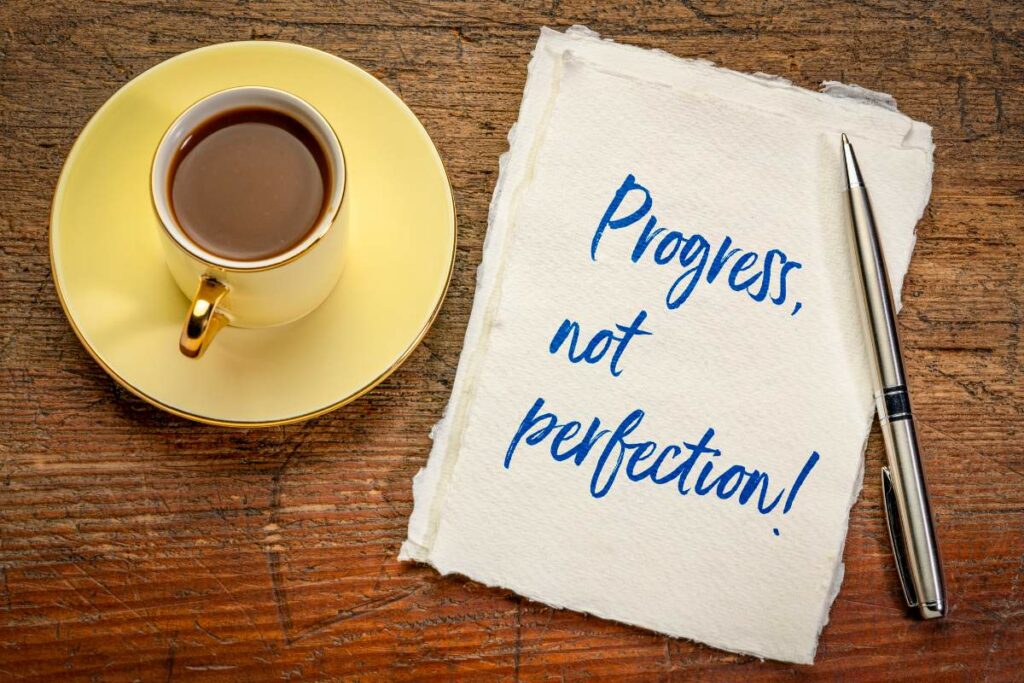The Mental Health Aspect of Weight Loss: Importance of a Positive Mindset
Weight loss. It’s a topic that’s almost always associated with exercise routines, diet plans, and the physical aspects of health.
Yet, there’s another key piece to this puzzle that’s often glossed over — our mental health. This unsung hero plays a starring role in our journey to weight loss, and today we’re turning the spotlight onto it.
Because let’s face it, the road to weight loss is as much a mental journey as it is a physical one, and a positive mindset can be a game-changer.

This post may contain affiliate links, which helps keep this content free. Please read our disclosure for more info.
The Mind-Body Connection in Weight Loss
There’s a fascinating dance happening in our bodies, an intricate partnership between our minds and bodies.
They’re not isolated systems but rather two parts of a whole, constantly communicating and influencing each other.
Have you ever had one of those days where you’re all stressed out, and suddenly your stomach feels like it’s auditioning for the lead role in a horror movie?
Or how about when anxiety seems to be your new (unwanted) best friend, and it feels like your metabolism has taken a permanent vacation?
These are prime examples of your mind and body in conversation, and it can often feel like they’re speaking in a language you don’t understand.
Our mental and emotional states can create a physiological response.
For example, chronic stress triggers the release of the hormone cortisol. This isn’t a bad thing in short bursts – in fact, it’s a vital part of our ‘fight or flight’ response.
However, when this becomes a constant state of affairs, it can lead to higher insulin levels, a drop in metabolism, and an increase in fat storage, especially around the belly area.
The result? Weight gain, which can often come as an unexpected and unwelcome surprise.
This mind-body interaction doesn’t stop at stress. Feelings of sadness or depression can also influence our eating habits and exercise routines, often leading to weight fluctuations.

When we’re feeling down, we might reach for high-fat, high-sugar ‘comfort foods’ or skip our regular workout.
On the other hand, positive emotions like happiness and contentment can inspire us to make healthier food choices and remain active.
There’s a growing body of scientific research that substantiates this mind-body connection in weight loss.
Studies have shown that individuals who practice stress management techniques not only lose more weight but are also more successful at keeping it off. This is a clear demonstration of the power our mental state holds over our physical health.
So, if you’re on a weight loss journey, take a moment to consider not just what you’re eating or how you’re moving, but also what you’re thinking and feeling.
Paying attention to your mental wellbeing isn’t just good for your mind – it’s a crucial component of your weight loss journey, too.
Achieving your weight loss goal is not just about shedding physical pounds, but also about nurturing a healthy mindset.
Your body listens to your mind, so let’s make sure we’re sending it the right messages.
Mental Health Challenges in Weight Loss
Losing weight is more than just a physical journey, it’s a mental and emotional roller-coaster ride.
Sure, the idea of shedding pounds and reaching that dream weight sounds exciting, but let’s pull back the curtain and take a look at the less-talked-about side of the process — the mental challenges that tag along.
First on the list is body image issues. Our society places a high premium on certain body shapes and sizes, often painting a picture that anything outside these ‘ideal’ standards is undesirable.

It can be hard not to internalize these messages. This struggle can create a distorted self-image, where no matter how much progress you make, it never feels quite enough.
Then there’s the pressure to meet specific weight goals. You set out with an ambitious number in mind, but what happens when the scale doesn’t budge or moves slower than you’d like?
It can chip away at your motivation and send your self-esteem on a nosedive. This constant pressure can create an unhealthy relationship with the scale, where your self-worth is intrinsically tied to a number.
Perhaps one of the most concerning risks on this journey is developing an obsession with weight and diet, which can snowball into full-blown eating disorders.
What starts as a desire to lose weight can become an unhealthy fixation that severely impacts both physical and mental health.

And finally, we cannot ignore the weight stigma and societal pressures that come into play. We live in a world that often equates thinness with happiness, success, and worth.
This can lead to feelings of inadequacy and self-doubt, creating a mental environment that’s anything but conducive to healthy weight loss.
All these challenges underscore why mental health cannot be an afterthought in the weight loss process. It’s not enough to just address the physical aspects of weight loss; we also need to tackle these mental health challenges.
Recognizing them is the first step towards addressing them. And remember, it’s okay to seek help to navigate these challenges. Your mental health is just as important, if not more, than any weight loss goal.
The Power of a Positive Mindset

When it comes to weight loss, it’s easy to get caught up in the numbers game — the pounds lost, the inches gone, the calories burned.
But there’s another, equally important element that doesn’t always get the attention it deserves: your mindset. And not just any mindset, but a positive one.
What exactly does that mean, and why is it so crucial to your weight loss journey?
A positive mindset isn’t about pretending that everything is sunshine and rainbows all the time, or brushing problems under the carpet.
Rather, it’s about shifting your perspective to see the silver lining, even in challenging situations. It’s about viewing your weight loss journey as a path of progress, not perfection.
Think about those days when you slip up on your diet plan or miss a workout. A positive mindset takes these moments, not as reasons to give up, but as opportunities to learn and grow.
Maybe that extra cookie is a signal that you need to find better ways to deal with stress. Perhaps skipping the gym is a reminder that it’s essential to find exercises you genuinely enjoy.
A positive mindset also involves replacing self-criticism with self-compassion. So, instead of berating yourself for making a ‘mistake’, you acknowledge that everyone has off days, and what’s important is that you’re trying to make healthier choices.
But why is a positive mindset so important? Well, it brings a whole host of benefits to your weight loss journey.
For starters, it keeps you motivated. When you focus on the progress you’re making, you’re more likely to stick with your healthy habits.

It also helps you bounce back faster from setbacks. Rather than getting stuck in a cycle of negative self-talk and guilt, you’ll be ready to pick yourself up, dust off, and get back on track.
Plus, a positive mindset equips you with better stress management strategies, reducing the likelihood of resorting to unhealthy coping mechanisms like emotional eating.
And we’re not just spouting pretty words here; there’s a wealth of scientific evidence to back this up.
Research shows that people who maintain a positive mindset are not only more successful at losing weight but also at keeping it off in the long term.
So, while counting calories and stepping up the workouts are key pieces of the weight loss puzzle, don’t forget the crucial role your mindset plays.
Cultivating a positive outlook could be just the thing to help you power through your weight loss journey, with your motivation and self-esteem intact.
Strategies for Cultivating a Positive Mindset
Now that we’ve established the importance of a positive mindset in your weight loss journey, you might be wondering, “How do I cultivate this positivity?”
Don’t worry, we’ve got your back. Let’s explore some effective strategies you can adopt.

Practice Mindfulness and Meditation
Mindfulness is the art of being fully present and engaged in the here and now. When you’re mindful, you’re more likely to notice your habits, like emotional eating or skipping workouts.
Meditation can be a powerful tool to enhance mindfulness. Even a few minutes of daily meditation can help you become more aware of your thoughts and feelings, without judgment.
Physical Activity
It’s not just for burning calories! Regular physical activity is a fantastic mood booster, thanks to the release of endorphins — the body’s natural ‘feel-good’ hormones.
It doesn’t have to be a strenuous workout; even a short walk or a dance break can lift your spirits.
Cognitive-Behavioral Strategies
These strategies can help you identify and challenge negative thought patterns that may hinder your weight loss efforts.
For example, if you often think, “I’ll never be able to lose weight,” you can learn to recognize this as just a thought, not a fact, and replace it with a more positive and realistic belief, such as, “Weight loss is a challenge, but I can do it if I take small steps and remain consistent.”
Self-Compassion and Self-Care
Be your own best friend! Celebrate your achievements, no matter how small, and forgive yourself when you stumble.

Remember, everyone has off days, and it’s okay. Prioritize self-care, too. This might mean ensuring you get enough sleep, taking time to relax and do things you enjoy, or even preparing a healthy meal for yourself.
Gratitude Practice
Regularly acknowledging what you’re grateful for can shift your focus from what’s going wrong to what’s going right.
It could be as simple as being thankful for your body’s ability to move, for the healthy food you have access to, or for the support of loved ones on your weight loss journey.
Social Connections
Don’t underestimate the power of positive relationships. Surrounding yourself with supportive, understanding people can help reinforce your positive mindset.

Cultivating a positive mindset doesn’t happen overnight. It takes time and practice, and that’s okay.
The journey towards a healthier, happier you is not a race — it’s a marathon. And each step you take in nurturing your mindset is a step towards a more successful weight loss journey.
Getting Help and Support
Even the most determined of us can sometimes use a helping hand, especially when embarking on a journey as challenging and multifaceted as weight loss.
A strong support system can be a pillar of strength in these times, providing motivation, perspective, and comfort when the going gets tough.
Personal Support Network
Your personal support network includes friends and family members who are there for you, cheering you on every step of the way. This kind of support can be invaluable.
Share your goals with them, let them know how they can support you, whether that’s joining you for a workout, helping you choose healthy food options, or just being there to listen when you need to talk.
It’s okay to lean on them when you need to — that’s what they’re there for.
Support Groups

Sometimes, it helps to connect with others who are on the same journey as you. Joining a weight loss support group, either in-person or online, can offer a sense of community and understanding that’s hard to find elsewhere.
It’s a space to share your experiences, challenges, and victories, and to learn from others’ journeys. You’ll find that you’re not alone, and that can be incredibly empowering.
Professional Support
There may be times when your weight loss journey feels overwhelming, and it starts to take a toll on your mental health.
If you’re feeling constantly anxious, depressed, or excessively preoccupied with your weight, it might be time to seek professional help.
Mental health professionals, like psychologists and therapists, are trained to help you navigate these challenges.
They can provide strategies to cope with stress, improve your body image, and strengthen your relationship with food and exercise.
Seeking help from a dietitian or a fitness coach can also be beneficial. They can provide personalized advice and plans tailored to your needs, preferences, and goals.
They can also help you adjust your plans as needed, ensuring you’re pursuing weight loss in a safe and healthy way.
Online Resources

There’s a wealth of online resources available, from blogs to podcasts to online courses, which offer advice and tips on cultivating a positive mindset for weight loss.
Just remember to ensure the information you’re consuming is credible and evidence-based.
At the end of the day, remember that there’s no shame in seeking help. It doesn’t mean you’re weak or failing — quite the opposite.
It shows your commitment to your wellbeing and your determination to succeed in your weight loss journey.
So, whether it’s a friend’s encouraging words, a support group’s camaraderie, or a therapist’s guidance, reach out for the help you need. You’re not in this alone, and with the right support, you’re stronger than any challenge that comes your way.
Harnessing the Power of Positivity: The Final Word and Your Next Steps
As we draw this post to a close, there’s one central takeaway we’d like you to remember: Your mental health isn’t just a footnote on your weight loss journey; it’s a key player.
A positive mindset can be a potent ally, helping you navigate the ups, downs, twists, and turns of this journey with grace and resilience.
And now, for those of you who are looking to kick-start or enhance your weight loss journey, we’d like to introduce our 21-Day Fat Loss Challenge.

More than just a diet and workout plan, this challenge includes a motivation guide that delves into the mindset aspect of weight loss.
This guide offers tools and strategies to cultivate that all-important positive mindset, empowering you to tackle the mental challenges that can arise during weight loss.
Click here to learn more about the 21-Day Fat Loss Challenge!
As you embark or continue on your weight loss journey, remember to nurture your mind alongside your body. After all, true health and wellness are a harmonious blend of physical and mental wellbeing.
We’d love to hear your thoughts and experiences on this topic. Have a story to share or some wisdom to pass on?
Let’s keep this conversation going and spread the word about the mental health aspect of weight loss on our social media platforms. Because the more we talk about it, the more we can support each other on this journey.

